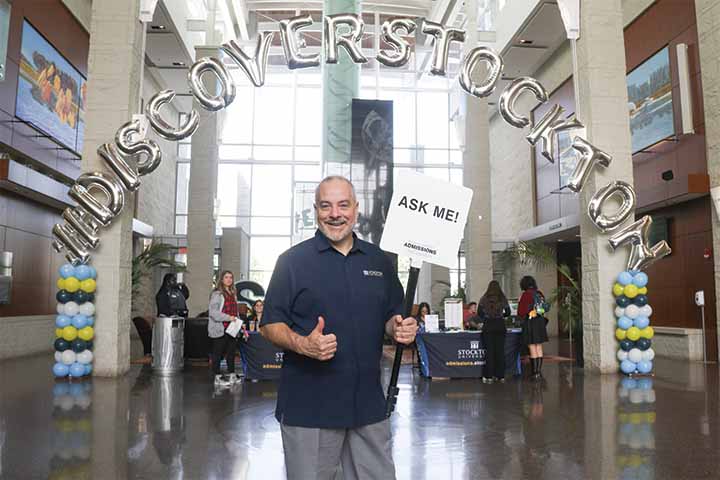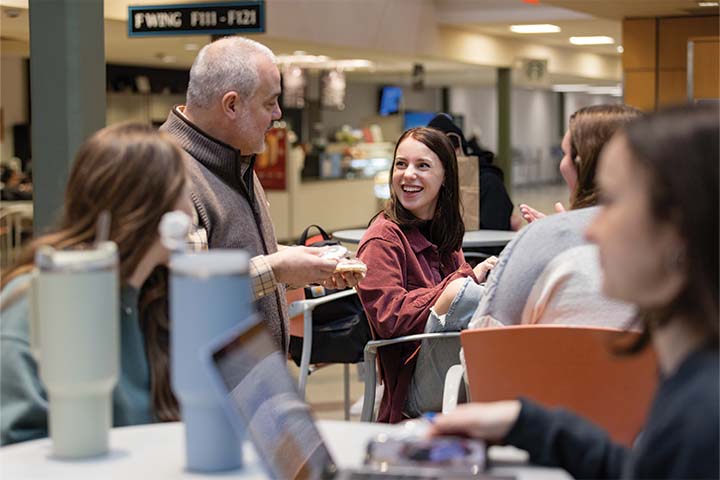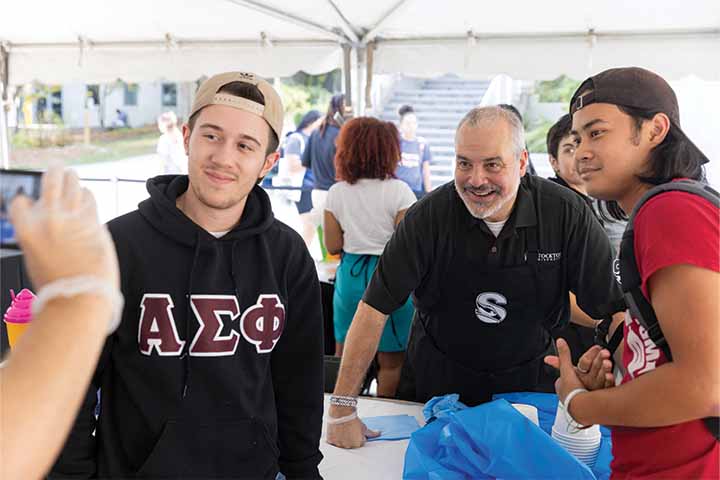Empathy in Action
Empathy in Action
By Samantha Whitehurst '13
H ave you ever wondered about your impact on others? Did a small interaction you had with a stranger or acquaintance mean much to them? Maybe you shared just a bit of your own story with another – to let them know they’re not alone, or to speak your truth into the world.
Well, if you shared just a piece of yourself in conversation with Joe Bertolino, the answer is yes – you made an impact. No matter how small of an interaction you think you may have had, it mattered to President Joe.
When sitting down and talking with Stockton’s sixth president, it’s clear that he values every member of the Stockton community, and truly every individual he’s had the opportunity to meet in his 30-year career in higher education. And it is his personal goal to make sure every one of these individuals know that they matter.

Bertolino bills himself as a social justice educator, and his passion for equity started from his own experiences as a gay man who came out later in life during a time when LGBTQ issues were not talked about, and the HIV/AIDS epidemic added another layer of stigma.
“When I finally came to my own realization about who I am, and that light bulb went off I then came out pretty quickly. I was already 26 years old and as far as I was concerned, I was already out of the house. I already had a career, so I think my mindset was, ‘Well if everybody turns their back on me, I already have a life, I’ll be okay.’ So I didn’t have to worry about things that others during that time period did,” he said.
He further explains that seeing others in the LGBTQ community deal with homophobia and difficult times drove him to speak out on the issue. He and his now-husband Bil Leopold created a program called “When the Gays Move into Mr. Roger’s Neighborhood” that discussed what it meant to be an ally and aimed to put a face on the community.
“We must have traveled all over the country, speaking to tens of thousands of students over the course of 15 years. That’s really where the work began, by educating and training my own staff in student affairs, my own students, and then moving out to other students and other campuses.”
While presenting at colleges across the country, Bertolino became more cognizant of the experiences of other minoritized groups that he had not previously appreciated while growing up. So, combining his own experiences and then the experiences of those around him and those of the people he cared about, he continued to find himself drawn to social justice.

Bertolino recalled one of the most “powerful” moments for him came while he was the Vice President for Student Affairs at Queens College. He learned as it got closer to graduation that a number of his students, particularly students from Southeast Asia, were undocumented.
If you’re willing to listen, learn and engage the conversation, the rest falls into place. It doesn’t mean you walk away from the table agreeing, but it does mean you walk away respecting and understanding.”
Bertolino also shared that connecting with some of the Muslim students at his institution, and hearing about how they were treated as young teens following the September 11th terrorist attacks would “eat at him.”
“I realized that regardless of my sexual orientation, I am still a privileged white man with power. What is my responsibility? How am I going to use that? To educate about justice and equity and fairness,” he said. “It’s not really that complex for me. When I ask folks to treat each other with dignity and respect, kindness, compassion, and civility, I’m like, ‘What? What’s the problem here?’”
When asked for his definition of social justice, he says, “Understanding that not everyone comes from the same starting point. I think it’s easy to tell people to pull themselves up by their own bootstraps, but then you assume they have bootstraps to begin with.”
His longer definition repeats the same word several times: understanding. And that’s really at the heart of what he does every day.
“What I was most concerned about was starting over. It takes a long time to build relationships, for the community to get to know you and to trust you,” he said about taking on the role at Stockton.

“I’m learning a lot about the political landscape and what is important to people here. In general, I found everybody to be terrific, regardless of their political affiliation. If you’re willing to listen, learn and engage the conversation, the rest falls into place. It doesn’t mean you walk away from the table agreeing, but it does mean you walk away respecting and understanding.”
Understanding, and treating everyone with the five pillars of his ethic of care – dignity, kindness, respect, compassion and civility - inform everything President Joe does in an effort to make sure everyone feels they’re valued.
The one thing he wants Stockton students to feel upon graduation?
“I want them to feel valued. I want them to know they matter. I want them to know what it’s like to belong, be seen and be heard.”
Get to Know President Joe
My go-to order at a diner: Breakfast. Two eggs over medium, blueberry pancakes, crispy bacon.
My current favorite spot on campus: The fireplace in the Grand Hall. It's hard not to like that space.
The top artists on my playlist: I listen to a lot of Michael Buble, Harry Connick, Jr. and Janis Joplin.
The book currently on my nightstand: The 14th Colony by Steve Berry
Something most people don't know about me: I'm more of an introvert than people think I am. I have to be an extrovert a lot of the time, so I'm content going in a quiet space, alone and binge-watching something.
Also, I love B-rated horror films. The cheesier the better.
I can't start my day without: Coffee.
My favorite class from undergrad: History
Learn more about Stockton's leadership



